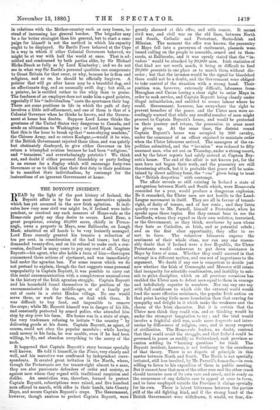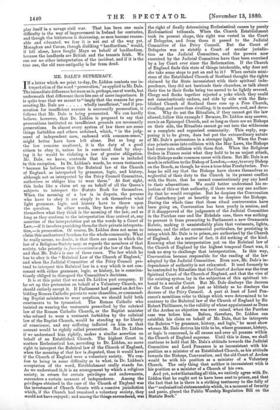THE BOYCOTT INCIDENT.
DEAD by the light of the past history of Ireland, the It Boycott affair is by far the most instructive episode which has yet occurred in the new Irish agitation. It indi- cates Bow very near civil war might be, if Ireland were inde- pendent, or received any such measure of Home-rule as the Home-rule party say they desire to secure. Lord Erne, a great proprietor, owning 40,000 acres, chiefly in Ferma- nagh, owns a property in Mayo, near Ballinrobe, on Lough Mask, admitted on all hands to be very leniently managed. Lord Erne recently granted his tenants a reduction of ten per cent. in consideration of the bad times ; but they demanded twenty--five, and on his refusal to make such a con- cession, declined in many cases to pay any rent at all. Captain Boycott—his agent, who also holds a farm of him—thereupon commenced three actions of ejectment, and was immediately laid under the agrarian ban. For some reason which we do not pretend to explain, though the fact suggests some personal unpopularity in Captain Boycott, it was possible to carry out this social excommunication with a completeness unusual even in the history of the Irish agrarian struggle. Captain Boycott and his household found themselves in the position of the excommunicated in the middle-ages, or of a family put out of caste in a strict Hindoo village. No one would serve them, or work for them, or deal with them. It was difficult to buy food, and impossible to remove the crops; while Mr. Boycott himself was in danger of his life, and constantly protected by armed police, who attended him step by step over his farm. His house was in a state of siege, the very tradesmen refusing to irritate " the country " by delivering goods at his doors. Captain Boycott, as agent, of course, could not obey the popular mandate ; while having sunk money in his farm, he was unable, even if he had been willing, to fly, and abandon everything to the mercy of the mob.
It happened that Captain Boycott's story became specially well known. He told it himself, in the Times, very clearly and well, and his narrative was confirmed by independent corre- spondents. It created great irritation in the North, where, though the Protestants are for tenant-right almost to a man, they are also passionate- defenders of order and society, as against men whom they regard with traditional suspicion and dislike. An association was, therefore, formed to protect Captain Boycott, subscriptions- were raised, and five hundred men offered to march, with rifles in their hands, into County Mayo, and secure Captain Boycott's crops. The Government, however, though anxious to protect Captain. Boycott, were greatly alarmed at this offer, and with reason. It meant civil war, and civil war on the old lines, between North and South, Catholic and Protestant, Scoto-Irish and Milesian. The moment the offer was known, the peasantry of Mayo fell into a paroxysm of excitement, placards were- issued calling on the people to assemble, armed and in thou- sands, at Ballinrobe, and it was openly stated that the "in- vaders " would be attacked by 20,000 men. Irish statistics of that kind are not worth much, it being at difficult to feed 20,000 peasants in one place as to march them without dis- order; but that the invasion would be the signal for bloodshed there could not be a doubt, and the Government were obliged- to take control of the situation with a strong hand. Their' position was, however, extremely difficult, labourers from' Monaghan and Cavan having a clear right to enter Mayo in. order to seek service, and Captain Boycott being clearly under illegal intimidation, and entitled to secure labour where he could. Government, however, has everywhere the right to prevent breaches of the peace, and the Ulster men were ac- cordingly warned that while any needful number of men might proceed to Captain Boycott's house, and would be protected• on their journey and return, the procession in arms must be given up. At the same time, the district round Captain Boycott's house was occupied by 900 cavalry, under the command of an officer enjoined to maintain order when the Ulster labourers arrived. The managers of the ex- pedition submitted, and the "invasion" was reduced to fifty unarmed men, who set out on Thursday, under a strong escort, and by the latest reports had safely arrived at Captain Boy- cott's house. The end of the affair is not known yet, for the men have not begun their work, and the peasantry are still threatening attack, but it is probable that peace will be main- tained by direct military force, the " cue" given being to treat • the "Brithih despotism ' with contempt.
The affair reveals as still existing in Ireland a state of antagonism between North and South which, were Home-rule conceded for a year, would produce a dangerous explosion.
Be it remarked, the Ulster men are not hostile to the Land- League movement in itself. They are all in favour of tenant- right, of fixity of tenure, and of low rents , and they listen quietly even to Mr. Parnell, himself a Protestant, when he speaks upon those topics. But they cannot bear to see the landlords, whom they regard as their own vedettes, terrorised, or the Government, as they think, overborne by men whom they hate as Catholics, as Irish, and as potential rebels ; and on the first clear opportunity, they offer to re- sort to force. The volunteer labourers express the sentiment of their whole class, nor can any one reason- ably doubt that if Ireland were a free Republic, the Ulster Protestants would endeavour to put down resistance in Mayo by force of arms. Whether they could succeed in that attempt is a different matter, and one not of importance to the argument. We doubt if any one is competent to decide just now whether the Irish of Connaught and Munster still retain that incapacity for scientific combination, and inability to sub- mit to strict discipline, which on all previous occasions has enabled the Ulster men to defeat men equal to them in courage and indefinitely superior in numbers. Nor can any one say with full confidence to which side the external world would lend the more effective assistance, the popular Irish notion on that point having little more foundation than that craving for sympathy and delight in it which make the weakness and the charm of the Irish character. But it is certain that the Ulster men think they could win, and so thinking would be under the strongest 'temptation to try ; and the trial would involve a frightful civil war, made more desperate and inter- necine by differences of religion, race, and in many respects of civilisation. The Home-rule leaders, no doubt, contend that they could avoid the struggle, and that Irelard could be governed in peace as readily as Switzerland, each province or canton settling its " burning questions" for itself. The Boycott incident, however, is not testimony to the soundness of that theory. There is no dispute of principle in this, matter between North and South. The North is not specially irritated, still less insulted, by Mr. Parnell's demands,—is even willing to listen to his exposition of them in public meeting. But it cannot bear that men of the other race and the other creed, should terrorise men of its own race and creed, and is ready on the occurrence of any definite case to appeal at once to force, and to force employed outside the Province it claims specially. for its own. There is latent bitterness between the parties still .of the old fighting kind, and if the strong band of the 13iitish Government were withdrawn, it would, we fear, die- play itself in a savage civil war. That has been one main difficulty in the way of improvement in Ireland for centuries, and though the bitterness is decreasing, as men become reason- able and educated, we fear it is not out of the way yet. Monaghan and Cavan, though disliking " landlordism," would, if left alone, have fought Mayo on behalf of landlordism, because the landlords are British and the tenants Irish. We can see no other interpretation of the incident, and if it is the true one, the old race-antipathy is far from dead.



































 Previous page
Previous page